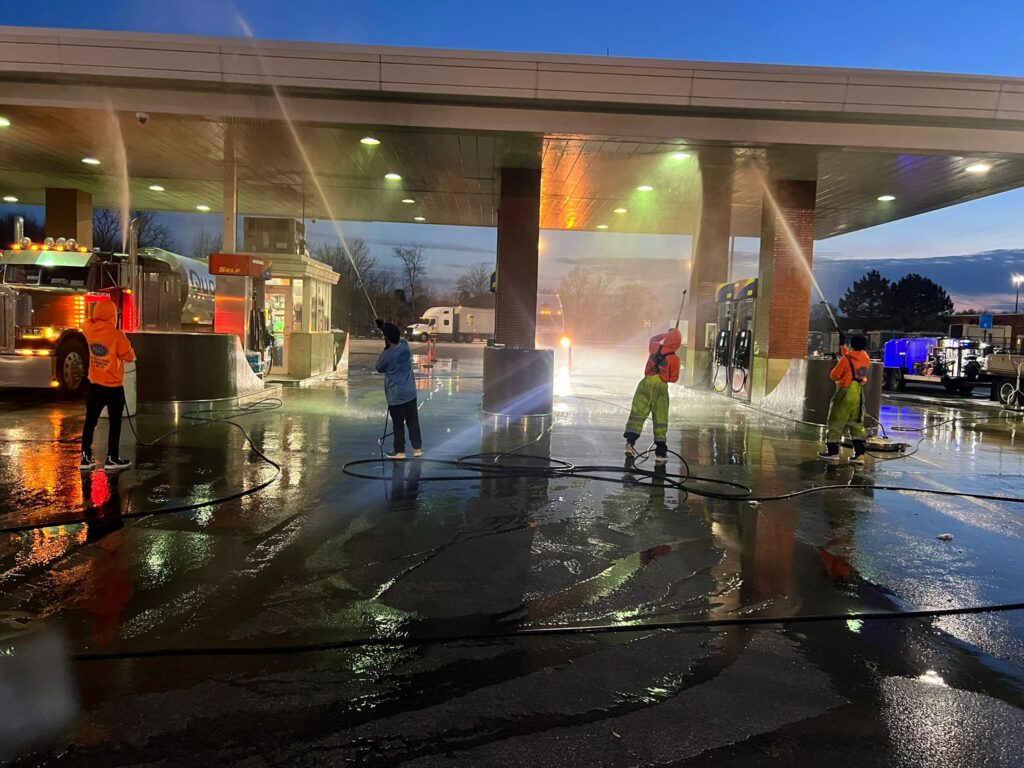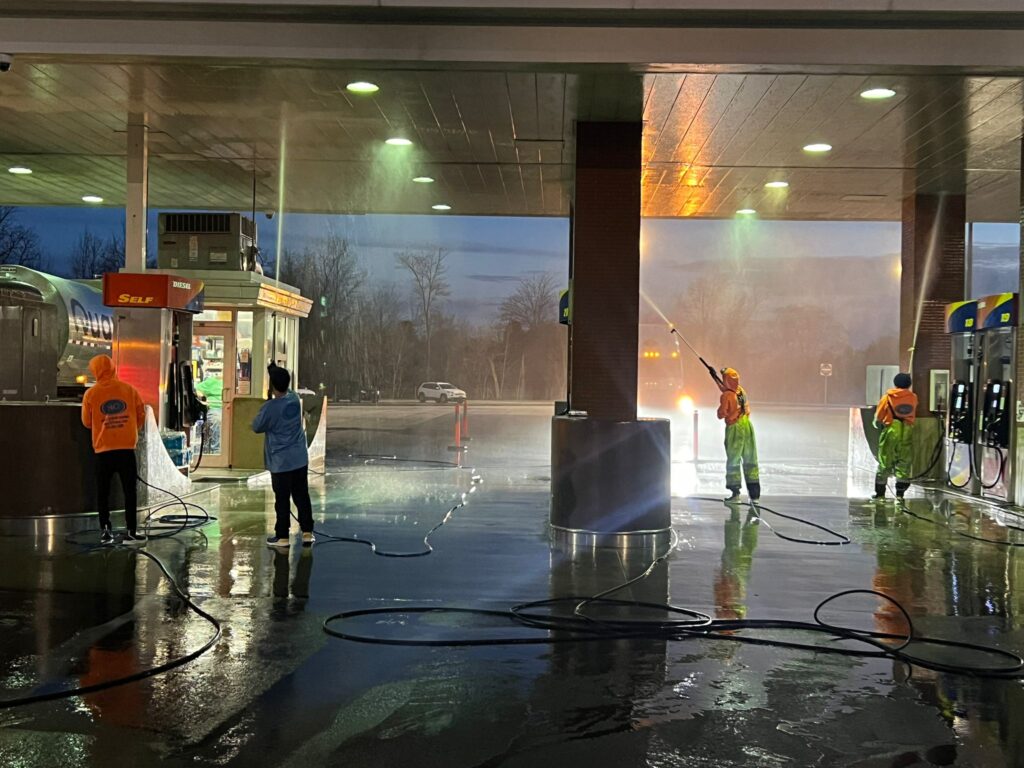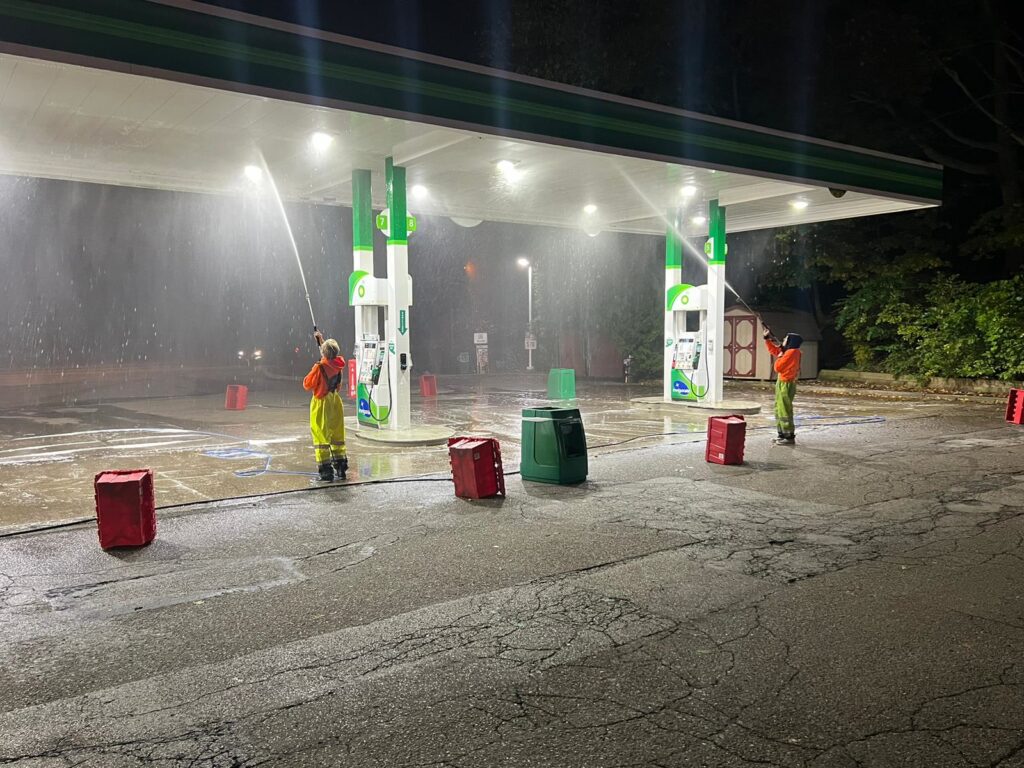
Gas stations serve as essential hubs for fuel, convenience items, and various automotive services. However, the high volume of traffic, fuel spills, and environmental factors can lead to significant grime and debris accumulation on the premises. Regular pressure washing is a vital maintenance practice that not only enhances the aesthetic appeal of gas stations but also ensures compliance with safety and environmental standards. This article explores the benefits of gas station pressure washing, incorporating manufacturer recommendations and industry insights.
1. Enhancing Safety and Compliance
One of the primary benefits of pressure washing gas stations is the improvement of safety. Oil, fuel spills, and other contaminants can create slippery surfaces, posing a risk to customers and employees. The National Institute for Occupational Safety and Health (NIOSH) highlights the importance of maintaining a clean work environment to reduce accidents. Regular pressure washing can mitigate these risks, helping gas station owners maintain a safe environment. According to NIOSH, slips, trips, and falls are among the leading causes of workplace injuries. A well-maintained gas station minimizes these hazards, ensuring both employees and customers can move freely without the risk of injury.
Additionally, many local and state regulations mandate cleanliness and spill prevention measures for gas stations. Pressure washing helps ensure compliance with these regulations, preventing potential fines and legal issues. The Environmental Protection Agency (EPA) emphasizes that gas stations must manage their waste and ensure that contaminants do not leak into the environment. Regular pressure washing is crucial in preventing fuel and oil from seeping into stormwater systems, which could lead to environmental degradation and hefty fines for non-compliance.
2. Extending Equipment Lifespan
Regular maintenance through pressure washing can extend the lifespan of a gas station’s equipment, including pumps, canopies, and signage. The buildup of grime and contaminants can cause wear and tear on equipment, leading to costly repairs or replacements. The Pressure Washers of North America (PWNA) suggests using high-pressure cleaning techniques to remove harmful substances that can lead to corrosion and mechanical failures. In particular, the accumulation of dirt and grease on fuel pumps can affect their functionality and lead to malfunctions that could disrupt service.
Manufacturers of pressure washing equipment, such as Kärcher and Simpson, recommend regular cleaning of outdoor equipment to maintain operational efficiency. For example, Kärcher advises gas station owners to regularly clean surfaces using pressure washers with hot water to effectively remove oil and grease, ultimately enhancing the durability of the equipment. By investing in regular cleaning, gas station owners can save on long-term maintenance costs and ensure that their equipment operates smoothly and efficiently.

3. Boosting Aesthetic Appeal
First impressions matter, especially in a competitive market. A clean and well-maintained gas station attracts more customers and enhances brand reputation. According to a survey conducted by the American Customer Satisfaction Index (ACSI), cleanliness significantly impacts customer satisfaction and loyalty in the retail sector, including gas stations. A visually appealing environment encourages repeat visits and fosters customer loyalty, ultimately driving sales.
Pressure washing can revitalize surfaces, including sidewalks, parking lots, and building exteriors. Utilizing pressure washing techniques, such as surface cleaning and degreasing, ensures that all areas of the gas station are visually appealing. By removing dirt, oil stains, and other blemishes, gas station owners can create a welcoming atmosphere that encourages customers to stop for fuel or convenience items. Manufacturers like Generac recommend regular cleaning to maintain aesthetic standards and attract new customers, emphasizing the role of appearance in customer retention. An investment in cleanliness is an investment in the gas station’s reputation and profitability.
4. Environmental Benefits
Pressure washing not only enhances the safety and aesthetics of gas stations but also provides environmental benefits. By effectively removing contaminants such as oil, grease, and dirt, pressure washing helps prevent these substances from entering stormwater systems and harming local ecosystems. The EPA advocates for best management practices, including regular pressure washing, to reduce pollution in urban areas. This aligns with broader sustainability initiatives that many businesses are adopting to promote environmental stewardship.
Moreover, many pressure washing manufacturers are now focusing on eco-friendly cleaning solutions. For instance, companies like EcoClean Solutions produce biodegradable detergents that can be used in conjunction with pressure washing, ensuring that cleaning practices are safe for the environment. This approach not only enhances compliance with environmental regulations but also appeals to eco-conscious consumers. By demonstrating a commitment to sustainability through effective cleaning practices, gas station owners can differentiate themselves in a competitive market.
5. Improving Customer Experience
The customer experience is crucial in the service industry, and a clean gas station can significantly enhance this experience. Customers are more likely to feel comfortable and satisfied at a well-maintained facility. According to a study by the International Journal of Hospitality Management, cleanliness is one of the top factors influencing customer satisfaction in the service industry. A clean gas station reflects professionalism and attention to detail, which can lead to positive word-of-mouth referrals and increased business.
Moreover, a clean environment encourages customers to utilize additional services often offered at gas stations, such as car washes, convenience stores, and automotive repairs. When customers perceive a gas station as clean and well-maintained, they are more likely to trust the quality of these additional services. This trust can lead to increased sales across various aspects of the business, enhancing overall profitability.
6. Cost-Effectiveness of Regular Maintenance
While some gas station owners may hesitate to invest in regular pressure washing, considering it an unnecessary expense, the long-term benefits far outweigh the costs. Regular maintenance can prevent more significant problems that require expensive repairs. For example, the buildup of oil and grime can lead to corrosion of pumps and other equipment, necessitating costly replacements. By proactively investing in pressure washing, gas station owners can minimize these risks and save money in the long run.
Additionally, manufacturers of pressure washing equipment, such as Ryobi and Briggs & Stratton, often highlight the cost savings associated with regular maintenance. These savings can be realized not only through extended equipment life but also through improved operational efficiency. Clean equipment operates more effectively and can lead to reduced energy costs, as dirty equipment often requires more energy to function correctly.

Conclusion
Gas station pressure washing offers numerous benefits, including enhanced safety, extended equipment lifespan, improved aesthetic appeal, environmental protection, and better customer experiences. Following manufacturer recommendations and industry best practices ensures that gas station owners can maintain a clean and compliant facility. Regular pressure washing not only meets regulatory requirements but also contributes to a positive customer experience and sustainable operations.
Investing in pressure washing services and equipment is a wise decision for gas station owners, positioning them for success in a competitive market while also promoting safety and environmental responsibility. By implementing a structured pressure washing regimen, gas station owners can enhance their operations and ensure they provide a safe, clean, and welcoming environment for their customers.
Sources
- National Institute for Occupational Safety and Health (NIOSH). (n.d.). Safety and Health Topics. Retrieved from NIOSH Website
- Environmental Protection Agency (EPA). (n.d.). Gas Station Operations and Compliance. Retrieved from EPA Website
- Pressure Washers of North America (PWNA). (n.d.). Pressure Washing for Commercial Applications. Retrieved from PWNA Website
- American Customer Satisfaction Index (ACSI). (n.d.). Customer Satisfaction in Retail. Retrieved from ACSI Website
- Kärcher. (n.d.). Cleaning Solutions for the Retail Sector. Retrieved from Kärcher Website
- Generac. (n.d.). The Importance of Regular Cleaning. Retrieved from Generac Website
- EcoClean Solutions. (n.d.). Biodegradable Cleaning Solutions. Retrieved from EcoClean Solutions Website
- Ryobi. (n.d.). Gas Station Equipment Maintenance. Retrieved from Ryobi Website
- Briggs & Stratton. (n.d.). Importance of Equipment Maintenance. Retrieved from Briggs & Stratton Website
By implementing a structured pressure washing regimen, gas station owners can enhance their operations and ensure they provide a safe, clean, and welcoming environment for their customers.
